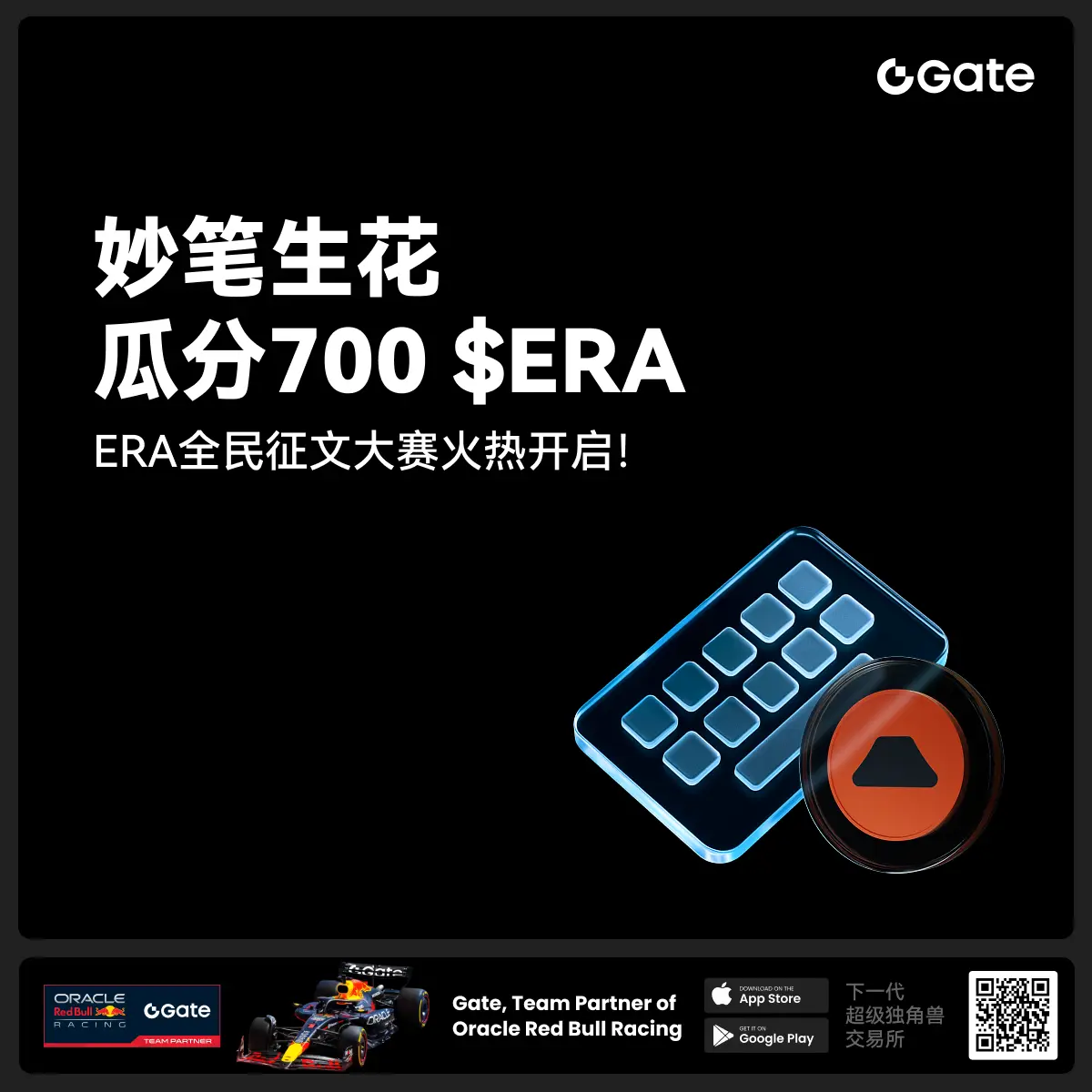- 話題1/3
14k 熱度
22k 熱度
16k 熱度
54k 熱度
20k 熱度
- 置頂
- 📢 Gate廣場 #MBG任务挑战# 發帖贏大獎活動火熱開啓!
想要瓜分1,000枚MBG?現在就來參與,展示你的洞察與實操,成爲MBG推廣達人!
💰️ 本期將評選出20位優質發帖用戶,每人可輕鬆獲得50枚MBG!
如何參與:
1️⃣ 調研MBG項目
對MBG的基本面、社區治理、發展目標、代幣經濟模型等方面進行研究,分享你對項目的深度研究。
2️⃣ 參與並分享真實體驗
參與MBG相關活動(包括CandyDrop、Launchpool或現貨交易),並曬出你的參與截圖、收益圖或實用教程。可以是收益展示、簡明易懂的新手攻略、小竅門,也可以是現貨行情點位分析,內容詳實優先。
3️⃣ 鼓勵帶新互動
如果你的帖子吸引到他人參與活動,或者有好友評論“已參與/已交易”,將大幅提升你的獲獎概率!
MBG熱門活動(帖文需附下列活動連結):
Gate第287期Launchpool:MBG — 質押ETH、MBG即可免費瓜分112,500 MBG,每小時領取獎勵!參與攻略見公告:https://www.gate.com/announcements/article/46230
Gate CandyDrop第55期:CandyDrop x MBG — 通過首次交易、交易MBG、邀請好友註冊交易即可分187,500 MBG!參與攻略見公告:https://www.gate.com/announcements
- 🎉 Gate廣場“星火計劃”入駐KOL突破1000人!
💥 創作者生態迎來全面爆發期!
📈 上首頁、拿獎勵、贏影響力,你還在等什麼?
💰 現金激勵 ✔️
🚀 流量扶持 ✔️
👑 專屬認證 ✔️
從0到1000,我們只用了短短數周,Gate廣場正在成爲Web3內容風暴眼⚡
你發布的不只是內容,而是下一個“爆款機會”!
🌟 加入星火計劃,開啓你的爆發之路!
👉 https://www.gate.com/announcements/article/45695
#GateSquare # #星火计划# #内容创作者新纪元 # #KOL集结令#
- 📢 #Gate广场征文活动第三期# 正式啓動!
🎮 本期聚焦:Yooldo Games (ESPORTS)
✍️ 分享獨特見解 + 參與互動推廣,若同步參與 Gate 第 286 期 Launchpool、CandyDrop 或 Alpha 活動,即可獲得任意獎勵資格!
💡 內容創作 + 空投參與 = 雙重加分,大獎候選人就是你!
💰總獎池:4,464 枚 $ESPORTS
🏆 一等獎(1名):964 枚
🥈 二等獎(5名):每人 400 枚
🥉 三等獎(10名):每人 150 枚
🚀 參與方式:
在 Gate廣場發布不少於 300 字的原創文章
添加標籤: #Gate广场征文活动第三期#
每篇文章需 ≥3 個互動(點讚 / 評論 / 轉發)
發布參與 Launchpool / CandyDrop / Alpha 任一活動的截圖,作爲獲獎資格憑證
同步轉發至 X(推特)可增加獲獎概率,標籤:#GateSquare 👉 https://www.gate.com/questionnaire/6907
🎯 雙倍獎勵機會:參與第 286 期 Launchpool!
質押 BTC 或 ESPORTS,瓜分 803,571 枚 $ESPORTS,每小時發放
時間:7 月 21 日 20:00 – 7 月 25 日 20:00(UTC+8)
🧠 寫作方向建議:
Yooldo
- 🎉Gate 2025 上半年社區盛典:內容達人評選投票火熱進行中 🎉
🏆 誰將成爲前十位 #Gate广场# 內容達人?
投票現已開啓,選出你的心頭好
🎁贏取 iPhone 16 Pro Max、限量週邊等好禮!
📅投票截止:8 月 15 日 10:00(UTC+8)
立即投票: https://www.gate.com/activities/community-vote
活動詳情: https://www.gate.com/announcements/article/45974
- 📢 #Gate广场征文活动第二期# 正式啓動!
分享你對 $ERA 項目的獨特觀點,推廣ERA上線活動, 700 $ERA 等你來贏!
💰 獎勵:
一等獎(1名): 100枚 $ERA
二等獎(5名): 每人 60 枚 $ERA
三等獎(10名): 每人 30 枚 $ERA
👉 參與方式:
1.在 Gate廣場發布你對 ERA 項目的獨到見解貼文
2.在貼文中添加標籤: #Gate广场征文活动第二期# ,貼文字數不低於300字
3.將你的文章或觀點同步到X,加上標籤:Gate Square 和 ERA
4.徵文內容涵蓋但不限於以下創作方向:
ERA 項目亮點:作爲區塊鏈基礎設施公司,ERA 擁有哪些核心優勢?
ERA 代幣經濟模型:如何保障代幣的長期價值及生態可持續發展?
參與並推廣 Gate x Caldera (ERA) 生態周活動。點擊查看活動詳情:https://www.gate.com/announcements/article/46169。
歡迎圍繞上述主題,或從其他獨特視角提出您的見解與建議。
⚠️ 活動要求:
原創內容,至少 300 字, 重復或抄襲內容將被淘汰。
不得使用 #Gate广场征文活动第二期# 和 #ERA# 以外的任何標籤。
每篇文章必須獲得 至少3個互動,否則無法獲得獎勵
鼓勵圖文並茂、深度分析,觀點獨到。
⏰ 活動時間:2025年7月20日 17
對孟巖同志的一些批評:少談些主義,多解決些問題
Author: Liu Honglin
Some criticisms of Comrade Meng Yan.
Today, Comrade Meng Yan published a long and eloquent article, expressing his emotion over the passage of the GENIUS Act by the United States, saying that this was the Bretton Woods Conference and the Nixon Shock in modern monetary history, and asserting that the "super-sovereign network" of the US dollar stablecoin has already incorporated the world into its system, and other countries are facing the beginning of a battle to defend their monetary sovereignty.
The article is moving, magnificent and broad-minded. I was a little dazed when I read it, as if I saw a prophet who had traveled through two centuries and was worried about the future of the entire human financial system.
But after calming down, I can't help but ask: Who did you write this article for?
If you are writing for the Chinese government, then you may have underestimated the country's strategic investment in blockchain in recent years. Since 2019, when the central bank proposed "blockchain as an important breakthrough for independent innovation of core technologies", it has promoted the implementation of DC/EP while clarifying the importance of blockchain from an institutional level; distributed ledger platforms with state-owned backgrounds have emerged in an endless stream, and alliance chains and industrial chain projects have blossomed everywhere.
Admittedly, not every project is reliable, but the accusation of "ignoring blockchain and falling behind" is probably not true.
If it is written for the industry, especially Chinese Internet entrepreneurs, it is even more unreasonable. Chinese Internet companies have never stopped exploring the direction of Web3 in recent years: NFT, public chain, wallet, and the entire metaverse... They have tried all kinds of things and suffered heavy losses. But at least they have never been absent. The reality is that under the double pressure of compliance restrictions and vague overseas policies, the paths that can really move from experimentation to implementation and from products to applications are very limited. We can criticize execution and vague sense of direction, but you can't say that they are not doing it.
If anyone really needs to say sorry to blockchain, it should be those financial scams that use the name of blockchain.
In the end, the person who was most moved by this article might be the author himself. He lamented that "blockchain needs to be understood again", lamented that "we once missed the opportunity", and even hoped to "say sorry to blockchain" - it sounded sincere and emotional.
But the question is: If one really loves this land as deeply and affectionately as the article expresses, shouldn't one get involved, work in the fields, and build it in a positive direction?
It is so easy to discuss philosophy from across an ocean.
I am not against criticism, nor am I against creating pressure at the level of public opinion, and I am not even against expressing some emotions occasionally. However, the development of the industry has never been driven by one or two emotional articles, but by those who work silently in the field and lay the infrastructure slowly.
"Talk less about theories and solve more problems" is what the industry needs most now.
The real question has never been "Are we aware of this technological revolution?" but "Do we have a way to make this revolution safe, practical and reliable within the existing institutional environment?"
This is the difficulty.
Many of the phenomena mentioned in the article, such as the slowdown in the pace of the Australian central bank after the pilot, the vacillation of Singapore's policies, and the reluctance to implement internal deductions by Wall Street banks, don't they indicate that this is not a "procrastination disease unique to China", but a global problem of complex game between technology and regulation, innovation and order?
Given all this background, it would be too hasty to attribute everything to "pretending to be asleep" or "collective misjudgment of technology."
In our industry, too many people have used "sentiments" to package their own views. Today they talk about currency revolution, tomorrow they talk about sovereignty challenges, and the day after tomorrow they talk about the transformation of civilization. But if you really ask: Are you a product developer? Or a compliance developer? Or a low-level developer? Many people do nothing. At most, they receive a few friends who work on the blockchain in the Bay Area, watch a few overseas conferences, and then come back to write an article about "The Strategic Lack of Global Governance."
This article is not without value. It makes more people aware of the international geopolitical significance of the US dollar stablecoin, which is a good thing. But if it is really as the article says, with the country and the people in mind, then I hope to do something practical like many entrepreneurs who quietly set up compliant exchanges and compliant stablecoins in Hong Kong, and like the technical teams that are working on on-chain payment infrastructure, even if it is just a small step.
Because what this industry lacks most is never articles, but applications; not shouting, but systems; not emotions, but construction.
Say sorry to blockchain? It is better to say thank you to the developers who are still working and those who are willing to start positive businesses.
We can't waste any more time on self-indulgent sentimentality.